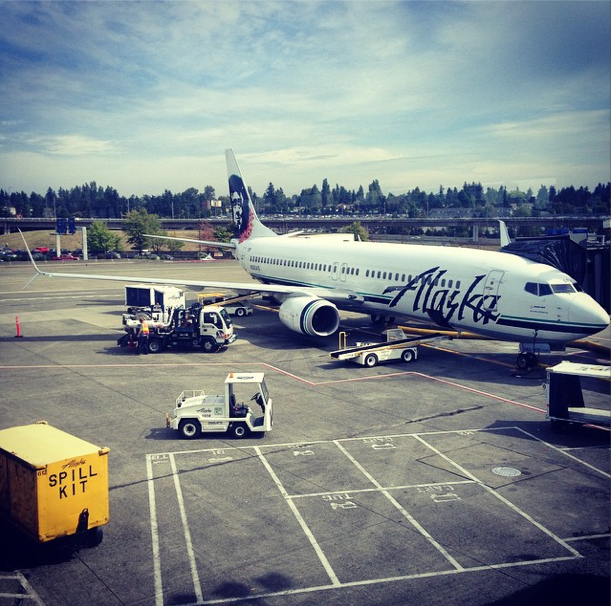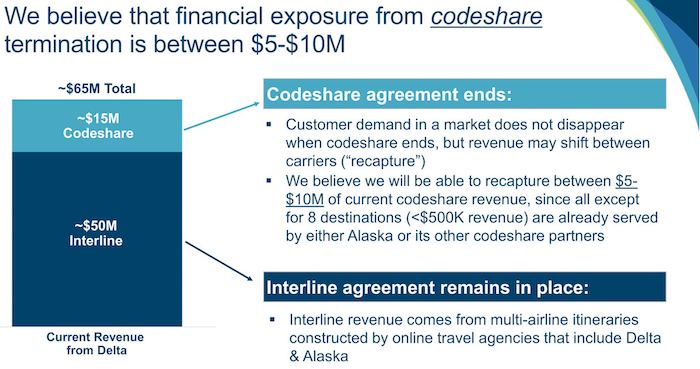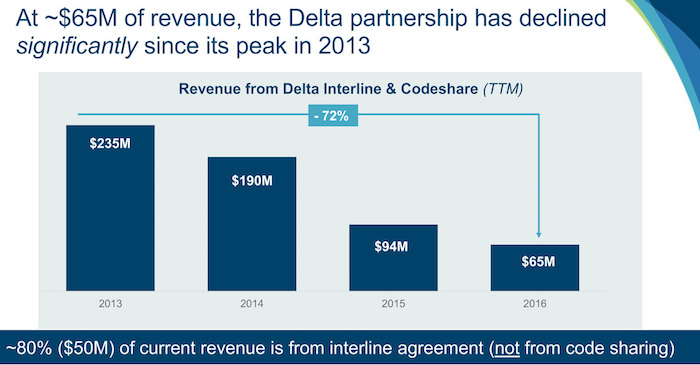On Monday we learned that Alaska and Delta are cutting ties as of May 1, 2017. The two airlines have been frenemies for years, as Delta’s presence in Seattle has continued to grow. Even so, they seemed better off together than separate.
However, Alaska’s takeover of Virgin America finally caused Alaska and Delta to cut ties, likely due to the increased number of routes on which the airlines overlap (Virgin America competes in many of the same transcon markets as Delta).
While this is bad news for frequent flyers, I have to commend Alaska for announcing several positive changes to help offset losing Delta as a partner. I’m feeling pretty great about Alaska Mileage Plan at the moment.
Why the partnership between Alaska & Delta was dysfunctional
In 2014 I wrote a post explaining what’s going on between Alaska and Delta in Seattle. The gist is that in 2012 Delta announced their plans to expand service to Seattle, and they wanted to partner more closely with Alaska. The idea was that Delta would add international flights out of Seattle, while Alaska would provide the domestic feed for those flights.
However, Alaska may have been a bit naive in thinking Delta didn’t have other motives. That’s because once Delta added a lot of international capacity, they started replicating Alaska’s regional routemap. After all, why should Delta send passengers onto Alaska flights when the airline could operate the flights themselves?
As a result, the airlines have continued to work together on paper, though have spited one another repeatedly.
Still, it always seemed to me like the two airlines were better off working together than not. Why? Because Alaska has an incredible route network within the Pacific Northwest and up and down the coast, and ultimately both airlines benefited from that. It gets Delta passenger one stop routings for longhaul flights, and also fills Alaska planes. Some of those are routes that it doesn’t make sense for Delta to operate themselves.

What’s the loss from Alaska & Delta cutting ties?
Alaska has filed with the SEC regarding the implications of the Alaska & Delta codeshare agreement being cut. Alaska expects that the financial exposure from terminating their codeshare agreement with Delta will be $5-10 million in 2017. That’s less than I was expecting.
Really Alaska is estimating that the lost revenue through the Delta codeshare will be $15 million, but that they’ll be able to recapture between $5-10 million of that, given that Alaska serves many of the same markets. That seems somewhat optimistic, as it assumes people are going out of their way to choose Alaska over Delta.
The much bigger share of the pie is with their interline agreement, which will continue. That’s when you book a ticket through an online travel agency that’s on multiple airlines.

It’s also interesting the degree to which the partnership between Alaska and Delta has declined since it peaked in 2013. The revenue from the Delta interline and codeshare agreement has decreased from $235 million in 2013, to just $65 million in 2016.

Bottom line
The impact here isn’t quite as big as I was expecting, given the scale of both Alaska and Delta operations in Seattle. At the same time, the interline agreement is the much bigger source of revenue here, and I don’t see much changing there.
Regardless, it’s interesting to see the numbers behind this agreement.





Ben,
I'm still not sure you get how loyal Pacific NW people are to Alaska/Horizon. When UA and DL were ripping us off for years for $600, 800 and even $1000 tickets SEA-SJC and PDX-OAK, you could at least count on Alaska to be a counter-weight.
Ultimately, I think DL comes out the loser. They manage STRICTLY by the numbers, not loyalty, and will quickly cut back in Seattle as soon as the first downturn...
Ben,
I'm still not sure you get how loyal Pacific NW people are to Alaska/Horizon. When UA and DL were ripping us off for years for $600, 800 and even $1000 tickets SEA-SJC and PDX-OAK, you could at least count on Alaska to be a counter-weight.
Ultimately, I think DL comes out the loser. They manage STRICTLY by the numbers, not loyalty, and will quickly cut back in Seattle as soon as the first downturn comes.
I'm not saying Alaska is perfect, but I am voting with my feet (UA `1K and AA EXP last year) and converting all my AA flight routes to Alaska accrual and using the Alaska routes back to the east coast in 2017.
AA has been a completely dumpster fire in the last 180 days for me and, well, United's still Untied.
John, I would argue that CVG was on the way out long before the NW merger. And look at what DL did to MEM after very strongly stating (pre-merger) they wouldn't do that. They're not even the top carrier at that airport anymore. It's a pretty sad place, and I said a few years ago that I wish AS would use it as a mini hub since the MAA would surely bend over backwards to...
John, I would argue that CVG was on the way out long before the NW merger. And look at what DL did to MEM after very strongly stating (pre-merger) they wouldn't do that. They're not even the top carrier at that airport anymore. It's a pretty sad place, and I said a few years ago that I wish AS would use it as a mini hub since the MAA would surely bend over backwards to get some use out of all that empty space. Don't get me wrong: I love much of what DL has done in recent years, but the cutbacks in many places have been tremendous. My hometown airport once had DL/NW flights to nearly a dozen cities. Now there's exactly one destination: ATL.
@Alpha. delta is an Excellent Airline, in my estimation having the best service by far of the Big 3 US Carriers. As for Cincinnati, it served its purpose well for DL until the Merger with NW made it geographically redundant, same as the situation with Cleveland after the CO/UA merger.
It seems like this analysis by Alaska does not account for the fact that some travelers who split their time across the two airlines and credit all flying to one or the other FFP may now decide to choose one side or the other more permanently. Such travelers may never book a codeshared ticket, but are still benefiting in a major way from the partnership.
That said, it's not clear which side such travelers...
It seems like this analysis by Alaska does not account for the fact that some travelers who split their time across the two airlines and credit all flying to one or the other FFP may now decide to choose one side or the other more permanently. Such travelers may never book a codeshared ticket, but are still benefiting in a major way from the partnership.
That said, it's not clear which side such travelers would choose, and indeed Alaska may even end up better off, if more people decide Alaska offers a better loyalty program. (From a miles and points perspective clearly Alaska does, but I can see why some people might choose Delta -- for example if you fly internationally a lot and value having comprehensive elite treatment on a single airline for both domestic and international flying.)
Year gone by for us International travelers the relationship was good, we got access to their global alliance, past few years naturally the available seats became slim other than coach with AF/KLM slim to none. I switched over the EK and American which works well for my travel needs. With the new bonus awards I am booking a R/T biz on EK to CPT nice score.
My only concern in all this is the...
Year gone by for us International travelers the relationship was good, we got access to their global alliance, past few years naturally the available seats became slim other than coach with AF/KLM slim to none. I switched over the EK and American which works well for my travel needs. With the new bonus awards I am booking a R/T biz on EK to CPT nice score.
My only concern in all this is the lost of access to a Global Alliance but thats me otherwise I think AS could care less about DL.
What a drop for 2014 to 2015.
After Delta got serious about Seattle, it was only a matter of time for this relationship to end - and I was pleasantly surprised it lasted this long. Being a west coast based flyer, the new Alaska is a nice alternative to Delta and United. The VX acquisition is looking like a smarter and smarter move going forward.
At the end of the day, Delta started building up their SEA domestic flying because Alaska wasn't giving them space on their flights to Seattle to feed the DL Seattle international flying. Alaska realized very rightly that it could fill the same LAX-SEA (or whatever) seat with a local passenger just going LAX-SEA than with a passenger going LAX-SEA-NRT, as the prorate of the revenue they were getting for the LAX-SEA from the DL passenger...
At the end of the day, Delta started building up their SEA domestic flying because Alaska wasn't giving them space on their flights to Seattle to feed the DL Seattle international flying. Alaska realized very rightly that it could fill the same LAX-SEA (or whatever) seat with a local passenger just going LAX-SEA than with a passenger going LAX-SEA-NRT, as the prorate of the revenue they were getting for the LAX-SEA from the DL passenger was less than they could get just selling the seats themselves. That's it. Period. DL saw that Alaska was choking off their international feed that was necessary to have the international flights work, and in desperation started their own domestic feeders. That's the only reason - Alaska could do better on their own and didnt need low-yield Delta travrlers taking up seats to/ from Seattle - seats they could fill themselves at higher fares/ yields.
Delta is a terrible airline. While they're trying to butter up Seattle, ask someone in Cincinnati what a great service their city gets.
As a side note, it was always hilarious how expensive Delta redemptions using Alaska miles were.
Delta is a rat back-stabbing airline, poaching on Alaska's territory after cozing up early on. Breaking ties keeps the integrity of the situation cleanly delineated.